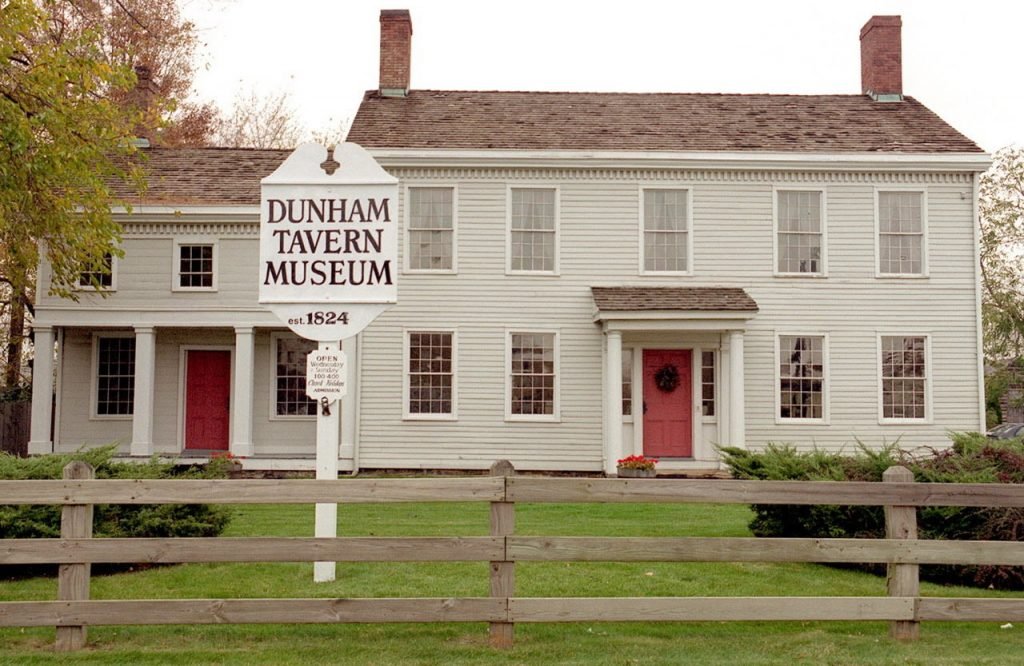Dunham Tavern Museum trustee and members sue to invalidate proposed sale of Museum property for use as new Cleveland Foundation headquarters
This morning, Dunham Tavern Museum trustee Christeen Tuttle, and Museum members Dick Parke and Dr. Ted Peterson, filed a lawsuit in the Cuyahoga County Court of Common Pleas seeking to invalidate the recently proposed sale of the Museum’s newly developed greenspace for use as the new headquarters of the Cleveland Foundation.

The Dunham Tavern was once a stagecoach stop on the road between Buffalo, New York and Detroit, Michigan. Today, it is the oldest building still standing on its original site in Cleveland, a designated Cleveland Landmark listed on the National Register of Historic Places, and a museum campus designed in stark contrast to the cityscape that surrounds it, to offer a glimpse of history and insight into the lifestyles of early Ohio settlers and travelers.
Between 2012 and 2017, the Museum raised over $700,000 from community members in a campaign to purchase and restore 2.28 acres of land (the “Greenspace”) that were a part of the original Dunham Tavern property, consistent with the organization’s stated mission and vision to “preserve, develop, and share historical Dunham Tavern Museum and its campus as an educational and cultural resource,” “provide an urban green space in Midtown Cleveland, and to return the Tavern to its roots by serving as a place for urban history, education, nature, and community.” By 2017, the space had been acquired and cleared for a new space for community gathering, walking trails, and gardens.
Shortly thereafter, Defendants Tim Collins and David Wagner, two members of the DTM board of trustees—who are also local businessmen who regularly profit from their involvement in transactions in the Cleveland real estate market—began to secretly orchestrate the sale of the newly acquired Greenspace to the Cleveland Foundation, through its proxy, LASSI Enterprises, LLC, for use as the site of Cleveland Foundation’s new headquarters. This sale—for which there was no apparent need or demand by the organization—was purportedly approved by a vote by the DTM board on May 14, 2019. The board approved this sale without seeking any competitive bids for the property, and without seeking any appraisals of its value apart from the one conducted by Hanna Commercial Real Estate, for which Wagner serves as a managing director.
As detailed in the Complaint, the Dunham Tavern Museum is located in a federally designated “opportunity zone,” and is thus subject to legislation giving private investors investing capital gains into real estate within the zone a range of potential tax breaks on the profits from those real estate investments. According to a March 2019 press release by the Greater Cleveland Partnership, “the floodgates are about to open regarding investment in opportunity zones,” and “the program has the potential to raise hundreds of millions of dollars in catalytic urban development opportunities here, stimulating growth and job creation in Cleveland and surrounding communities,” including the “Health-Tech Corridor” opportunity zone in which the Museum resides. Thus, the Complaint alleges, the time is especially ripe for investors to profit from real-estate transactions in the surrounding neighborhood, and construction of a new Cleveland Foundation headquarters on the Greenspace will cause surrounding real estate to increase in value significantly and substantially.
Accordingly, the Complaint further alleges that by recommending, facilitating, and participation in the proposed sale, Collins and Wagner have conferred a benefit on their past, current, and potential clients, and have thus conferred a benefit on themselves. Further, by virtue of their status as repeat players in Cleveland’s real estate market and, independently, as employees and/or shareholders in their respective businesses, a prominent commercial real-estate firm and a law firm with a substantial real estate practice, and Wagner and Collins have conflicts of interest and conflicts of responsibility that bar their participation in the proposed sale.
Due to these conflicts, and those of certain other DTM board members who voted to approve the transaction stand to profit personally and financially from the proposed sale, Plaintiffs allege that these members’ involvement in the transaction renders it void under the DTM bylaws, which expressly prohibit board members from voting on matters in which they have a conflict of interest or conflict of responsibility.
The lawsuit further alleges that as news of the proposed sale leaked to the public, the board proceeded to approve the transaction despite a wave of negative feedback from DTM membership, including a letter signed by 26 donors expressing their sense of “deep personal betrayal as a result of the [transaction],” and “pledg[ing] to halt future financial support for” the DTM in amounts that would cost the organization “multiple millions of dollars.”
“My clients are not opposed to the Cleveland Foundation building its new headquarters in the Midtown neighborhood, and would welcome such a development,” said Peter Pattakos, attorney for the plaintiffs. “It just doesn’t belong on the Dunham Tavern greenspace that community members recently donated $700,000 to restore, consistent with the Museum’s mission and historical character. There are plenty of alternative sites that would do, and my clients are entitled to answers in court about who Mr. Collins and Mr. Wagner sought to benefit by rushing this transaction through in violation of the Museum’s bylaws.”
In addition to Mr. Pattakos, Plaintiffs are also represented by Rachel Hazelet of the Pattakos Law Firm in Fairlawn, Ohio. The case is captioned Christeen Tuttle, et al. v. Tim Collins, et al., Cuyahoga C.P. No.CV-19-916042, with Judge Nancy M. Russo presiding. A copy of the filed complaint is available here.
